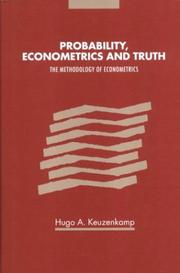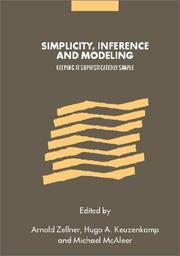| Listing 1 - 2 of 2 |
Sort by
|

ISBN: 0521553598 0521029732 0511116322 0511015798 0511156022 0511329024 0511493304 128015196X 0511053304 1107112850 9780511053306 9780521553599 9780511156021 9780511116322 9780511015793 9780511493300 9780521029735 Year: 2000 Publisher: Cambridge, UK ; New York : Cambridge University Press,
Abstract | Keywords | Export | Availability | Bookmark
 Loading...
Loading...Choose an application
- Reference Manager
- EndNote
- RefWorks (Direct export to RefWorks)
When John Maynard Keynes likened Jan Tinbergen's early work in econometrics to black magic and alchemy, he was expressing a widely held view of a new discipline. However, even after half a century of practical work and theorizing by some of the most accomplished social scientists, Keynes' comments are still repeated today. This book assesses the foundations and development of econometrics and sets out a basis for the reconstruction of the foundations of econometric inference by examining the various interpretations of probability theory which underlie econometrics. Keuzenkamp claims that the probabilistic foundations of econometrics are weak, and although econometric inferences may yield interesting knowledge, claims to be able to falsify or verify economic theories are unwarranted. Methodological falsificationism in econometrics is an illusion. Instead, it is argued, econometrics should locate itself in the tradition of positivism.
Probability theory --- Quantitative methods (economics) --- Econometrics --- Probabilities --- Econometrics. --- Probabilities. --- Business, Economy and Management --- Economics --- Probability --- Statistical inference --- Combinations --- Mathematics --- Chance --- Least squares --- Mathematical statistics --- Risk --- Economics, Mathematical --- Statistics

ISBN: 0521803616 0521121353 0511119593 0511041594 0511156715 0511329377 0511493169 1280154861 0511043813 1107123429 9780511041594 9780511043819 9780511119590 9780511493164 9780521803618 9781280154867 9780521121354 Year: 2001 Publisher: Cambridge ; New York : Cambridge University Press,
Abstract | Keywords | Export | Availability | Bookmark
 Loading...
Loading...Choose an application
- Reference Manager
- EndNote
- RefWorks (Direct export to RefWorks)
The idea that simplicity matters in science is as old as science itself, with the much cited example of Ockham's Razor, 'entia non sunt multiplicanda praeter necessitatem': entities are not to be multiplied beyond necessity. A problem with Ockham's razor is that nearly everybody seems to accept it, but few are able to define its exact meaning and to make it operational in a non-arbitrary way. Using a multidisciplinary perspective including philosophers, mathematicians, econometricians and economists, this 2002 monograph examines simplicity by asking six questions: what is meant by simplicity? How is simplicity measured? Is there an optimum trade-off between simplicity and goodness-of-fit? What is the relation between simplicity and empirical modelling? What is the relation between simplicity and prediction? What is the connection between simplicity and convenience? The book concludes with reflections on simplicity by Nobel Laureates in Economics.
Simplicity (Philosophy) --- Inference --- Econometrics --- Econometrics. --- Inference. --- Simplicity (Philosophy). --- Business, Economy and Management --- Economics --- Economics, Mathematical --- Statistics --- Ampliative induction --- Induction, Ampliative --- Inference (Logic) --- Reasoning --- Philosophy --- 117 --- 330.0151 --- 165.23 --- 330.115 --- 165.23 Kennis: begripsanalyse naar woordbetekenis; betekeningsvraagstuk --- Kennis: begripsanalyse naar woordbetekenis; betekeningsvraagstuk --- 330.115 Econometrie --- Econometrie
| Listing 1 - 2 of 2 |
Sort by
|

 Search
Search Feedback
Feedback About UniCat
About UniCat  Help
Help News
News